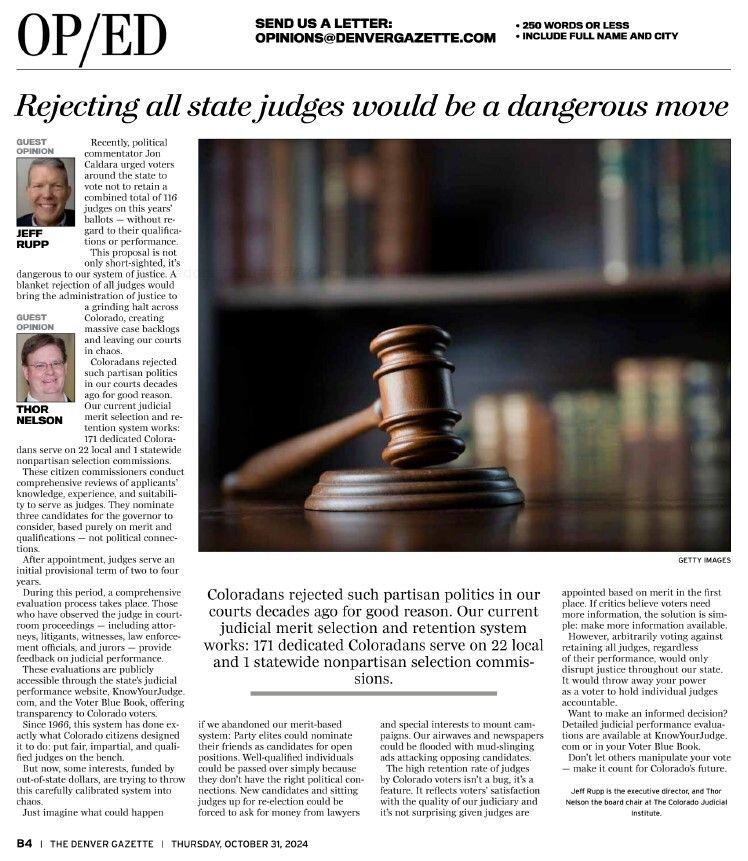
[Note: This CJI op-ed was originally published October 31, 2024, in both the print edition and website of The Denver Gazette. Reprinted here with permission.]
Recently, political commentator Jon Caldara urged voters to vote not to retain a combined total of 116 judges on this years’ ballots — without regard to their qualifications or performance.
This proposal is not only short-sighted, it’s dangerous to our system of justice. A blanket rejection of all judges would bring the administration of justice to a grinding halt across Colorado, creating massive case backlogs and leaving our courts in chaos.
Coloradans rejected such partisan politics in our courts decades ago for good reason. Our judicial merit selection and retention system works: 171 dedicated Coloradans serve on 22 local and 1 statewide nonpartisan selection commissions.
These citizen commissioners conduct comprehensive reviews of applicants’ knowledge, experience, and suitability to serve as judges. They nominate three candidates for the governor to consider, based purely on merit and qualifications — not political connections.
After appointment, judges serve an initial provisional term of two to four years.
During this period, a comprehensive evaluation process takes place. Those who have observed the judge in courtroom proceedings — including attorneys, litigants, witnesses, law enforcement officials, and jurors — provide feedback on judicial performance.
These evaluations are publicly accessible through the state’s judicial performance website, KnowYourJudge.com, and the Voter Blue Book, offering transparency to voters.
Since 1966, this system has done what Colorado citizens designed it to do: put fair, impartial, and qualified judges on the bench.
But now, some interests, funded by out-of-state dollars, are trying to throw this carefully calibrated system into chaos.
Just imagine what could happen if we abandoned our merit-based system: Party elites could nominate their friends as candidates for open positions. Well-qualified individuals could be passed over because they don’t have the right political connections. New candidates and sitting judges up for reelection could be forced to ask for money from lawyers and special interests to mount campaigns. Our airwaves and newspapers could be flooded with mud-slinging ads attacking opposing candidates.
The high retention rate of judges by Colorado voters isn’t a bug, it’s a feature. It reflects voters’ satisfaction with the quality of our judiciary and it’s not surprising given judges are appointed based on merit in the first place. If critics believe voters need more information, the solution is simple: make more information available.
However, arbitrarily voting against retaining all judges, regardless of their performance, would only disrupt justice. It would throw away your power as a voter to hold individual judges accountable.
Want to make an informed decision? Judicial performance evaluations are available at KnowYourJudge.com or in your Voter Blue Book.
Don’t let others manipulate your vote — make it count for Colorado’s future.
Jeff Rupp is the executive director, and Thor Nelson is the board chair at The Colorado Judicial Institute.

